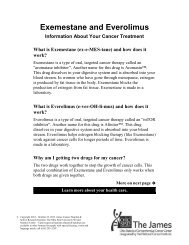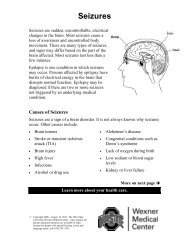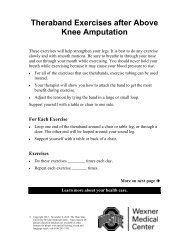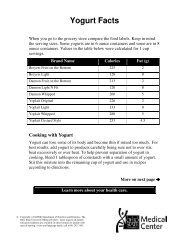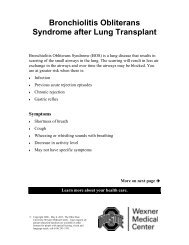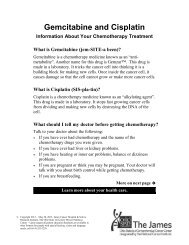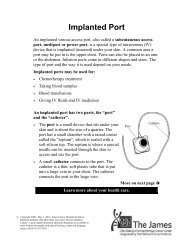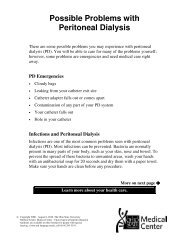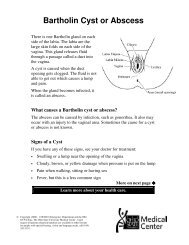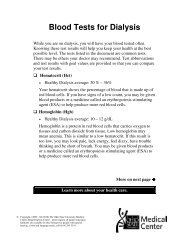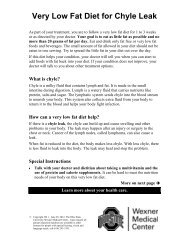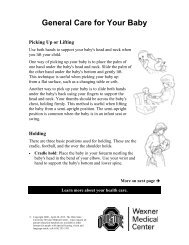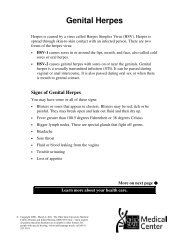Docetaxel - Patient Education Home
Docetaxel - Patient Education Home
Docetaxel - Patient Education Home
Create successful ePaper yourself
Turn your PDF publications into a flip-book with our unique Google optimized e-Paper software.
<strong>Docetaxel</strong><br />
Information About Your Chemotherapy Treatment<br />
What is <strong>Docetaxel</strong> (doe-se-TAKS-el) and how does it work?<br />
<strong>Docetaxel</strong> is a chemotherapy drug known as an “anti-microtubule<br />
inhibitor”. Another name for this drug is Taxotere®. It is a natural<br />
medicine that comes from yew trees. This drug fights cancer by<br />
stopping fast growing cancer cells from dividing and making new<br />
cancer cells.<br />
What should I tell my doctor before getting chemotherapy?<br />
Talk to your doctor about the following:<br />
If you have ever had chemotherapy and the name of the<br />
chemotherapy drugs you were given.<br />
If you have ever had heart, liver, or kidney problems.<br />
If you are allergic to medicines containing polysorbate 80 or<br />
“Tween 80”.<br />
If you are pregnant or think you may be pregnant. Your doctor will<br />
talk with you about birth control while getting chemotherapy.<br />
If you are breastfeeding.<br />
If you have been told that you need to start a new medicine.<br />
• The medicines/pills you are taking, including:<br />
Medicines prescribed by any of your doctors<br />
Herbs<br />
Vitamins<br />
Over-the-counter medicines<br />
© Copyright 2011 - May 28, 2013. James Cancer Hospital & Solove<br />
Research Institute, The Ohio State University Wexner Medical<br />
Center - Upon request all patient education handouts are available in<br />
other formats for people with special hearing, vision and language<br />
needs, call (614) 293-3259.<br />
Learn more about your health care.<br />
More on next page
Page 2<br />
How does my doctor decide my chemotherapy dose?<br />
To determine your treatment dose, your doctor will review the<br />
following: your height, your weight, your medicines, how well your<br />
liver is working, and any other health problems you have.<br />
This drug is given every three weeks. You will see the doctor or nurse<br />
practitioner before each chemotherapy treatment.<br />
Should I eat or drink before my treatment?<br />
It is best to eat a small meal before getting your treatment. Drinking<br />
plenty of non-caffeinated fluids may also be helpful. However, if you<br />
have been told to limit fluids, check with your doctor about how much<br />
you can drink.<br />
How will my treatment be given?<br />
Before your chemotherapy, you will be given several medicines to<br />
prevent nausea, vomiting or an allergic reaction. These medicines<br />
may affect your abilities, so for your safety you should have<br />
someone drive you home.<br />
<strong>Docetaxel</strong> is given directly into your blood stream through a tube (IV)<br />
placed in your arm or chest. <strong>Docetaxel</strong> comes in a bag with tubing<br />
attached. The nurse will connect the tubing to a pump. This treatment<br />
takes about 1 hour. Your entire visit, including your doctor’s<br />
appointment and your treatment will take about 4 hours.<br />
What are the side effects of this treatment?<br />
Every person responds differently to treatment. Some of the more<br />
common side effects of this chemotherapy are:<br />
Nausea and/or vomiting lasting for several days<br />
Numbness, tingling or pain in hands and feet<br />
Swelling of hands, feet or ankles<br />
Fatigue<br />
Excessive tearing
Changes in your nails<br />
Page 3<br />
Rash or other skin changes, including “hand and foot syndrome”.<br />
Hand and foot syndrome may cause tingling, numbness or pain on<br />
the palms of your hands and soles of your feet. Your hands and<br />
feet may become swollen or red and have small sores or blisters.<br />
Your skin may become very dry and begin cracking and peeling.<br />
Hair loss, including the hair on the head and body (this normally<br />
begins 10 to 14 days after chemotherapy)<br />
Mouth pain or open sores in the mouth<br />
Low white blood cell count (may increase your risk for infection)<br />
Low hemoglobin (may cause you to have less energy and tire more<br />
easily)<br />
Low platelet count (may cause you to bleed more easily or longer<br />
than normal and have more bruising)<br />
Muscle or joint aches and pain<br />
When should I call my doctor?<br />
You should call your doctor right away if you have any of the<br />
following signs or symptoms:<br />
Fever of 100.4 degrees Fahrenheit (38 degrees Celsius) or higher<br />
Chills, sore throat, cough or sores that do not get better<br />
Open sores in your mouth<br />
Nausea that prevents you from eating or drinking<br />
Vomiting even after you have taken your anti-nausea medicine<br />
Bleeding or bruising, including bloody or black stools or blood in<br />
your urine<br />
Diarrhea (4 or more loose stools in 24 hours)<br />
Shortness of breath or difficulty breathing<br />
• Fast weight gain<br />
Swelling in feet or ankles
Page 4<br />
Is there anything else I should know about this treatment?<br />
Some patients may have an allergic reaction while the <strong>Docetaxel</strong> is<br />
being given. To prevent this, you will be given a medicine called<br />
Dexamethasone to take at home before coming for your treatment.<br />
If an allergic reaction does happen during your treatment, the nurse<br />
will give you medicine to help manage the reaction and extra<br />
precautions will be taken when your next treatment is given.<br />
Chemotherapy may make it harder for your body to fight<br />
infections. Wash your hands often and avoid people who are sick.<br />
This treatment requires special precautions to prevent the<br />
chemotherapy drugs from coming into contact (through blood,<br />
urine, bowel movements, vomit and vaginal or seminal fluids) with<br />
others. Your chemotherapy nurse will give you guidelines to<br />
follow for 48 hours after receiving chemotherapy.<br />
Chemotherapy can change how your body reacts to vaccines. Talk<br />
to your doctor before getting any vaccines.<br />
You should drink 8 to 10 eight-ounce glasses of non-caffeinated<br />
fluid each day throughout your treatment. This is important to keep<br />
you hydrated while you are receiving chemotherapy.<br />
This treatment may cause women to stop having menstrual cycles.<br />
Depending on your age, your menstrual cycles may or may not<br />
return.<br />
It may be difficult to get pregnant even after the chemotherapy is<br />
finished.<br />
This treatment may affect your ability to have children. Talk to<br />
your doctor before getting chemotherapy if you are planning to<br />
have children in the future.<br />
For more information about cancer, chemotherapy, side effects or how to<br />
care for yourself during treatment, refer to your Chemotherapy and You<br />
book, or ask your doctor, nurse or pharmacist.<br />
Talk to your doctor or others on your health care team if you<br />
have questions. You may request more written information<br />
from the Library for Health Information at (614) 293-3707 or<br />
email: health-info@osu.edu.



